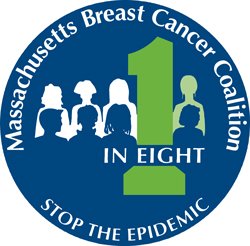Earlier this week the Federal Interagency Breast Cancer and Environmental Research Coordinating Committee (IBCERCC) released a monumental report “Breast Cancer and the Environment: Prioritizing Prevention.” The Massachusetts Breast Cancer (MBCC) is ecstatic that breast cancer prevention and environmental links to the disease are gaining attention from the federal government.
We want you to share in our excitement and so, we have created this summary for you:
|
What is the report “Breast Cancer and the Environment: Prioritizing Prevention”?
The Breast Cancer and the Environment Research Act, passed by Congress in 2008, required the establishment of the IBCERCC to look at the state of current information and research on breast cancer and the environment, to identify gaps in knowledge, and to recommend ways to fill these gaps. This 270 page report, released on Tuesday, February 12, 2013 summarizes the findings and of IBCERCC. The full report outlines the burden on society produced by breast cancer and describes major advances in prevention, diagnosis, and treatment. It summarizes evidence for environmental risk factors from human and animal studies taking care to point out themes crosscutting the two. While each and every page is critical to the understanding of current knowledge in the field, we are most interested in the seven recommendations for moving forward towards true prevention of breast cancer. |
| What does the report recommend?
1. PRIORITIZE PREVENTION: We need a national strategy to increase and prioritize federal funding of research in breast cancer prevention. MBCC has been calling for increased funding of prevention research for years, and we created Silent Spring Institute (SSI) in 1994 to help fill this gap.
2. TRANSFORM HOW RESEARCH IS CONDUCTED: We need a more transdisciplinary approach to research in order to overcome some limitations of current methodologies such as the interrelationship between genes and environmental factors, exposure over a lifetime, multiple risk factors working in combination, critical periods or ages at which an individual may be more or less susceptible to different risks, and disproportionate exposure and rates of breast cancer for minority populations.
3. INTENSIFY THE STUDY OF ENVIRONMENTAL FACTORS: We need more research on the chemical and biological risk factors including endocrine disruptors, low-dose radiation, and other environmental agents that affect the mammary gland.
This is an area in which our sister organization, Silent Spring Institute (SSI), has been focusing since their inception. SSI has generated several studies linking environmental carcinogens and endocrine disrupting chemicals to the development of mammary tumors in animal studies (Chemical Effects on Mammary Gland Development). SSI has also been instrumental in detecting and measuring the levels of known and emerging contaminants chemicals homes (Household Exposure Study and Flame Retardant Research) and drinking water (Public Drinking Water Supplies and Private Drinking Water Wells)
4. PLAN ACROSS FEDERAL AGENCIES:
We need more coordination between federal, state, and nongovernmental organizations to close gaps in research linking breast cancer and the environment.
5. ENGAGE PUBLIC STAKEHOLDERS: We need to ensure that future research projects include the voice of the public and affected communities. In this recommendation the IBCERCC calls for more “active participation of breast cancer advocates, community representatives, and members of the public in research planning and prioritization.” This was our goal at MBCC when SSI was founded as a research institute with clear and concrete ties to breast cancer activists, ensuring that the voice of the people is heard throughout the research process.
6. TRAIN TRANSDISCIPLINARY RESEARCHERS: We need federal programs to help facilitate transdisciplinary research.
7. TRANSLATE AND COMMUNICATE SCIENCE TO SOCIETY: We need to make the communication of research results an integral piece of all research on breast cancer and the environment. Here, too, MBCC is ahead of the game. With SSI researchers, we assist in the presentation of research findings and implications directly back to the community via speaking engagements and educational programs on Cape Cod, throughout Massachusetts, and across the country.
|
